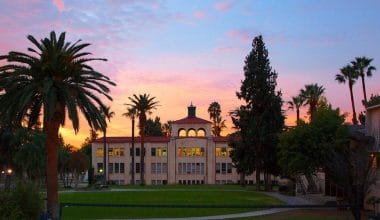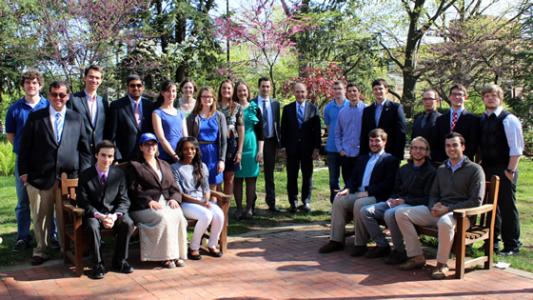Purdue University is one America’s finest universities up for review. We are seizing this opportunity to relate to you at the latest when it comes to how to study at Purdue University.
In this Purdue University review, we bring you the latest details on Purdue University Admission, Pardue University Courses, Purdue University Acceptance Rate, Pardue University Ranking, and Pardue University Tuition Fees.
Before we get it underway, we awill give you a brief history of the prestigious Purdue University.
Table of Contents
About Purdue University
Founded in 1869, Purdue University is the flagship institution of the Purdue University system. Its campus is located in the small city of West Lafayette.
There are 13 academic colleges and schools offering more than 200 different undergraduate majors, 70 postgraduate programs and vocational degrees. The very first PhD presented by the university in 1897 was in agriculture, in line with the college’s long tradition in agricultural science and engineering. No Bachelor of Arts degree offered until 1959.
Even today, the engineering program is still the most reputed and competitive, and the university has been influential in the history of aviation in the United States over the years.
The very first college credit in flight training and the first four-year bachelor program in aviation were offered by Purdue. Sometime in 1934 Purdue University Airport was established as the first university-owned airport in the country.
Twenty-three Purdue alumni have become astronauts, including Neil Armstrong – the first person to walk on the moon – and Eugene Cernan – the last person to walk on the moon.
A total of four Purdue scientists have won Nobel Prizes while at the university: Herbert C. Brown (Chemistry in 1979), Ei-ichi Negishi for Chemistry in 2010 and Otto Doering together with Kevin Gurney for Climate Change research in 2007.
In 2010 the most recent school was founded: The College of Health and Human Sciences, combining the School of Nursing, the School of Health Sciences, the College of Consumer and Family Sciences and psychology, hearing and speech pathology majors from the College of Liberal Arts.
Purdue University Acceptance Rate
The Purdue University Acceptance Rate is 56%. From last year, 27,427 out of 49,007 applicants were admitted making Purdue a more competitive school to get into with a good chance of acceptance for qualifying applicants.
Academically, it has very high requirements for admission test scores, in most cases admitting students who score in the top 28 percent.
Purdue University-Main Campus usually accepts and attracts “A-” average high school students. Only 27% of those admitted choose to register in the school.
Purdue University Admission Requirements
SAT Requirements
Purdue University-Main Campus usually requires applicants to be in the top 34 percent of SAT test-takers. The University consistently takes SAT composite scores down to 1140 on an 1600 scale, below which admission should be considered a reach.
From our estimate, some students could be accepted with SAT’s as low as 1020.
The approximated average SAT composite for admitted freshmen is 1260 out of 1600. A competitive SAT score is critical as 66% of applicants submit SAT scores to the school.
ACT Requirements
Admission data shows that Purdue frequently accepts students with ACT’s of 25 and above. Successful applicants usually send ACT scores in the top 22 percent nationally.
From our estimate, the school accepts minimum ACT composite scores around 22 in some instances.
Future students submitting an ACT composite of 28 or higher should be in the upper half of applicants – and students with a 31 and above have very competitive chances. 59% of applicants submit ACT scores to Purdue University-Main Campus.
Purdue University University Ranking
The Purdue University Ranking according to the 2018 World University ranking sees Purdue University ranked 60th. It was also ranked 43rd by the US rankings in 2018.
Courses Offered at Purdue University
Below are the courses offered at Purdue University
Clinical, Pre-Clinical & Health
- Other Health
Social Sciences
- Communication & Media Studies
- Geography
- Sociology
- Politics & International Studies (incl Development Studies)
Life Sciences
- Biological Sciences
- Sport Science
- Veterinary Science
- Agriculture & Forestry
Engineering & Technology
- General Engineering
- Civil Engineering
- Mechanical & Aerospace Engineering
- Electrical & Electronic Engineering
- Chemical Engineering
Physical Sciences
- Chemistry
- Geology, Environmental, Earth & Marine Sciences
- Physics & Astronomy
- Mathematics & Statistics
- Psychology
Computer Science
Business & Economics
- Economics & Econometrics
- Business & Management
- Accounting & Finance
Law
Arts & Humanities
- Languages, Literature & Linguistics
- History, Philosophy & Theology
- Art, Performing Arts & Design
- Architecture
- Archaeology
Education
- Education
Purdue University Majors
The list below are the majors at Purdue University
Arts
- Acting
- Design and Visual Communications
- Drama and Theatre Production
- Fashion and Apparel Design
- Film and Video Studies
- Industrial and Product Design
- Interior Design
- Photography
- Studio Arts
- Theatre Design
Business
- Accounting
- Actuarial Science
- Business Administration and Management
- Financial Planning
- Hotel and Resort Management
- Management Sciences and Statistics
- Sales and Marketing
Education
- Agricultural Teacher Education
- Art Teacher Education
- Early Childhood Education
- Elementary Education
- English and Speech Teacher Education
- Foundations of Education
- Physical Education Teaching and Coaching
- Social Studies Teacher Education
- Special Education and Teaching
- Technology Teacher Education
Health Professions
- Dietetics and Clinical Nutrition
- Food and Nutrition Studies
- Food Science
- Foods, Nutrition, and Wellness Studies
- Kinesiology and Exercise Science
- Medical Laboratory Technician
- Nursing
- Pharmacy and Pharmaceutical Sciences
- Public Health Education
- Speech-Language Pathology
Humanities
- Anthropology and Archaeology
- Art History
- Communications
- Creative Writing
- Economics
- English
- Family Studies and Consumer Sciences
- Foreign Languages and Literature
- French Language and Literature
- German Language and Literature
- History
- Human Development
- Japanese Language and Literature
- Journalism
- Liberal Arts and Humanities
- Linguistics, Interpretation, and Translation
- North American Studies
- Philosophy
- Political Science and Government
- Professional, Technical, Business, and Scientific Writing
- Psychology
- Religious Studies
- Research and Experimental Psychology
- Russian and Eastern European Languages and Literature
- Sociology
- Women’s Studies
Science, Technology, and Math
- Aerospace Engineering
- Agricultural Business
- Agricultural Economics
- Agricultural Engineering
- Agricultural Mechanics and Machinery
- Agriculture
- Animal Sciences and Husbandry
- Atmospheric Sciences and Meteorology
- Biochemistry and Molecular Biology
- Bioengineering and Biomedical Engineering
- Biological and Physical Sciences
- Biology
- Botany and Plant Physiology
- Cellular Biology
- Chemical Engineering
- Chemistry
- Civil Engineering
- Computational and Applied Mathematics
- Computer Engineering
- Computer Graphics
- Computer Science
- Construction Engineering
- Ecology and Evolutionary Biology
- Electrical and Electronics Engineering
- Engineering
- Environmental Engineering
- Farm and Ranch Management
- Forestry
- Genetics
- Geology and Earth Science
- Horticultural
- Industrial and Engineering Management
- Industrial Engineering
- Information Technology
- Landscape Architecture
- Materials Engineering
- Mathematics & Statistics
- Mechanical Engineering
- Microbiology
- Natural Resources Conservation
- Neuroscience and Neurobiology
- Nuclear Engineering
- Physics
- Turf and Turfgrass Management
- Veterinary Technician and Assistant
- Wildlife and Fisheries Management
Trades and Personal Services
- Aeronautics and Aviation Technology
- Aerospace Engineering Technician
- Architectural Engineering Technician
- Aviation Management and Operations
- Electrical Engineering Technician
- Engineering Technology
- Industrial Production Technician
- Manufacturing Engineering Technician
- Mechanical Engineering Technician
- Professional Pilot
- Retailing Management
University Campus
Purdue University’s campus is situated in the small city of West Lafayette, near the western bank of the Wabash River, across which sits the larger city of Lafayette.
A State Street, which is concurrent with State Road 26, divides the northern and southern portions of campus.
Most academic buildings are concentrated on the eastern and southern parts of campus, with residence halls and intramural fields to the west, and athletic facilities to the north.
The Greater Lafayette Public Transportation Corporation (CityBus) operates eight campuses loop bus routes on which students, faculty, and staff can ride free of charge with Purdue Identification.
South Campus
The south area of State Street is home to Purdue’s agricultural, fine arts, life sciences, and veterinary buildings.
This area also comprises the Krannert School of Management, Horticulture Gardens, Discovery Park, Lyles Porter Hall and the Purdue Airport. The Krannert School of management has been nationally and globally ranked for undergraduate as well as graduate degree programs.
Krannert and Rawls Hall make provision for state of the art learning facilities to the majority of business classes on campus. Rawls Hall was built in 2006 with the help of a $10 million gift from Jerry S. Rawls, the largest in the management school’s history.
Lyles Porter Hall houses interdisciplinary healthcare facilities and classroom space within the College of Health and Human Sciences as well as the School of Medicine.
Students and clinical faculty within Nursing, Health and Kinesiology, Nutrition Science, Psychological Sciences, and Speech, Language and Hearing Sciences see approximately 3,000 patients a year within this state-of-the-art interdisciplinary healthcare facility.
The features of the building include; a nursing clinic, specialized preschool, exercise center, consultation space and demonstration kitchen for dietitians in training, clinical psychology facility, audiology and speech-language pathology clinics, cadaver laboratory for physicians during training, and research laboratories.
Purdue University Airport, which was officially established in 1930 was the first of its kind and remains one of only a few university-owned airports in the nation.
Including the Niswonger Aviation Technology Building, which was allocated in 2009, the facility symbolizes Purdue’s storied relationship with aviation.
West Campus
The western part of the University campus consists of student housing, dining, and recreation facilities.
Students can participate in club and intramural sports at the Córdova Recreational Sports Center, the Boilermaker Aquatic Center, and the intramural playing fields in this area.
The Córdova Recreational Sports Center, built-in 1957, is officially the first building in the nation created solely to serve university student recreational needs.
As a replacement for the former separate women’s and men’s gymnasiums, it was originally called the “Co-recreational Gymnasium”.
Despite several expansions and official name changes, it has been nicknamed as “the Co-rec” ever since.
Purdue University Tuition Fee
The total cost of attending Purdue University varies depending on factors such as where a student chooses to live, travel expenses, food costs, enrollment in a specific program or college/school, etc.
Below are the estimated costs of Purdue University Tuition fee for the 2020 academic year (two semesters of full-time enrollment). Part-time students can find the costs by credit hour on the Bursar website.
Residents of Indiana pay an annual total price of $22,812 to attend Purdue University-Main Campus on a full-time basis. This fee is comprised of $9,208 for tuition, $10,030 room and board, $1,160 for books and supplies and $784 for other fees.
Out of state residents are charged a total cost of $41,614 which is 82.4% higher than Indiana residents. The tuition charge is $28,010 while room and board are $10,030, books and supplies are $1,160 and other fees come in at $784.
Purdue University Notable Alumni
Purdue University alumni have achieved recognition in a range of areas, particularly in the science, engineering, and aviation industries. The university’s alumni pool holds over 15,000 United States patents.
Purdue University has produced 23 astronauts, including Gus Grissom, America’s second man in space and first to fly in NASA’s Gemini program,
Neil Armstrong, the first to walk on the moon, as well as Eugene Cernan, the last astronaut to do so. About one-third of all of NASA’s manned space missions have had at least one Purdue graduate as a crew member.
In science, the University has also produced Nobel Prize-winning physicists in Edward Mills Purcell and Ben Roy Mottelson, as well as Nobel Prize-winning chemist Akira Suzuki.
Other notable Purdue alumni in science include pioneer of robotics and remote control technology Thomas B. Sheridan; Ian Murdock founder of Debian; Chinese physicist Deng Jiaxian, a founding father and key contributor to the Chinese nuclear weapon programs; mathematician Yitang Zhang; chemist Lawrence Rocks; biochemist Edwin T. Mertz, credited with the discovery of high-protein corn and beans;
Indian chemist CNR Rao, who has been awarded the Bharat Ratna, the highest civilian award in India; physical organic chemist and advocate for women and minorities in science Nina Roscher.
Who received the ACS Award for Encouraging Women into Careers in the Chemical Sciences (1996) and the Presidential Award for Excellence in Science, Mathematics, and Engineering Mentoring (1998); and Professor Reuben J. Olembo, a geneticist and environmentalist who went on to become the Deputy Executive Director of UNEP and a UN Assistant Secretary-General, and who was recognized by Purdue in 1994 with a Distinguished Alumni Award for Agriculture.
Respected Purdue University Alumni In Business
In business and economics, the University alumni include Stephen Bechtel, Jr., owner of Bechtel Corporation; Federal Reserve Bank president Jeffrey Lacker; and popcorn specialist Orville Redenbacher.
In 2010, Bloomberg also revealed Purdue University was one of the universities in America with the most undergraduate alumni serving as chief executive officers of S&P 500 firms.
They are Gregory Wasson who is president/CEO of Walgreens; Mark Miller, chairman/president/CEO of Stericycle; Charles Davidson, chairman/CEO of Noble Energy, Inc.;
Samuel Allen, chairman /president/CEO of Deere & Company; Don Thompson, president/COO of McDonald’s; and John C. Martin (businessman), chairman/CEO of Gilead Sciences, Inc.
Purdue University Alumni in Government and Culture
In government and culture, the University alumni include Pulitzer Prize–winners Booth Tarkington and John T. McCutcheon, and Akinwumi Adesina, former Nigerian Minister of Agriculture and Rural development and current President of the African Development Bank; Essam Sharaf, former Egyptian Prime Minister;
Tom Moore, television and theater director; James Thomson, CEO of Rand Corporation; Brian Lamb, founder and CEO of C-SPAN; Harry G. Leslie, ex-Governor of Indiana; Kirk Fordice, former Governor of Mississippi; Earl Butz, former United States Secretary of Agriculture; Birch Bayh, former United States Senator; Herman Cain, 2012 Presidential Candidate; David McKinley, current West Virginia Congressman; Sun Li-jen, former Kuomintang general; Rammohan Naidu Kinjarapu, Indian Parliament member;
Dulquer Salmaan, Malayalam film actor; Anthony W. Miller, past United States Deputy Secretary of Education; and Hugo F. Sonnenschein, former University of Chicago president. Richard O. Klemm, ex-CEO of Food Warming Equipment and Illinois state legislator, also graduated from Purdue University.
Alumni in Sports From Purdue University
In sports, Purdue University has produced basketball coach John Wooden; basketball Hall of Famers Stretch Murphy, Piggy Lambert, and Rick Mount; NBA Champions Paul Hoffman, Herm Gilliam, Frank Kendrick, Jerry Sichting, Glenn Robinson, and Brian Cardinal; and NBA All-Stars Brad Miller, Terry Dischinger, and Joe Barry Carroll.
Purdue University has three NFL Super Bowl-winning quarterbacks in Drew Brees, Bob Griese, and Len Dawson. Additionally, a total of 19 of the University alumni have been on a Super Bowl-winning team as of 2011.
The University has also produced Super Bowl IV-winning coach Hank Stram. Daytona 500 winner Ryan Newman graduated from Purdue University with a bachelor’s degree in vehicle structure engineering.
Three alumni of Purdue University have received the Presidential Medal of Freedom, the highest civilian award of the United States: Neil Armstrong, Brian Lamb, and John Wooden.
The Dauch Alumni Center acts as a showcase for the university’s alumni. The 67,000-square-foot (6,200 m2) houses the offices of the Purdue Alumni Association and University Development.
It is a destination and gathering area for the Purdue University Alumni Association’s 69,000 members and more than 410,000 living alumni.
Online Programs at Purdue University
Purdue University now provides both credit and non-credit online degrees and programs.
For-credit programs include master’s degrees, associate degrees, graduate certifications as well as professional development.
Online master’s degrees are offered in different areas of study, including economics, business, aeronautics, aviation, communication, computer science, technology, engineering, and education, among others.
Online associate degrees are offered in a little number of areas including veterinary technology.
Graduate certificates are offered in noise control applied statistics, digital signal processing, communication management, applied heat transfer, and biotechnology. A variety of online professional development courses are obtainable for teachers.
FAQs
Purdue needs you to be above average in your high school class with a 3.69 GPA. A combination of A and B grades is required, preferably with more A grades than B. Harder coursework, such as AP or IB courses, might make up for a low GPA.
The West Lafayette campus of Purdue University is ranked 51st out of 443 National Universities. Schools are rated based on how well they perform against a set of generally recognized measures of quality. Learn more about our school rankings here.
Excellent Engineering College
A Big Ten university with a reputation “that is renowned all around the world and not just in the state of Indiana,” Purdue offers “a world-class education.” The university features a number of outstanding programs, including “a wonderful nursing program,” “a terrific pharmacy program,” and is particularly “renowned for being a strong engineering school.”
While the GPA requirements for each of Purdue University’s programs may vary, you should anticipate acceptance if your GPA is in the 3.5-3.9 area.
WE ALSO RECOMMEND:
- Stanford University Scholarships Opportunities for International Students, 2024 (SHARE)
- International Intermediate Fellowships 2024
- International Ambassador Scholarships at Salisbury University in USA, 2024
- International Student Scholarships at Kettering University in USA, 2024
- Haven of Peace Academy Merit Scholarships for Tanzanian Students, 2024
- 17 Scholarships for Bangladesh Students to Study in USA 2024
- 17 Scholarships for Uganda Students to Study in the USA
- 17+ Scholarships for Cote d’Ivoire Students to Study in the USA
DISCLOSURE: This post may contain affiliate links, meaning when you click the links and make a purchase, we receive a commission.






Comments are closed.